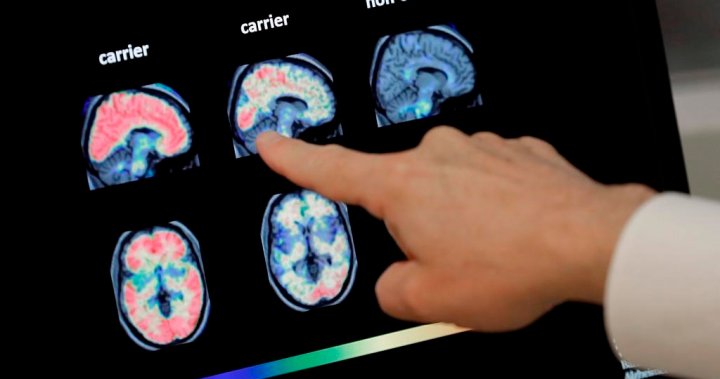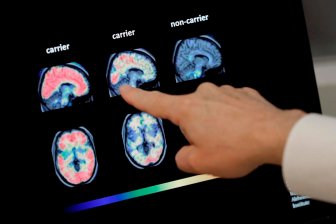An experimental Alzheimer’s drug slows down the disease, researchers say. Is there any difference? – Whole country

An experimental Alzheimer’s drug moderately slowed the inevitable deterioration of the brain disease, researchers reported Tuesday — but it remains unclear how much difference it will make to people’s lives. be.
Japanese pharmaceutical company Eisai and its US partner Biogen announced this fall that a much-needed bright spot, the drug lecanemab, would work after repeated disappointments in the quest for a better treatment for Alzheimer’s disease. announced that it appears to
read more:
Alzheimer’s drug shows signs of slowing disease in early results of global study
read more
-
![]()
Alzheimer’s drug shows signs of slowing disease in early results of global study
The company is now providing the full results of a study of about 1,800 people in the early stages of a mind-sapping disease. The data were presented at the Alzheimer’s Conference in San Francisco and published in The New England Journal of Medicine. U.S. regulators may approve the drug as early as he January.
Study participants received intravenous lecanemab or a dummy injection every 2 weeks for 18 months. The researchers tracked them using her 18-point scale, which measures cognitive and functional abilities.
A research team led by Dr. Christopher Van Dyke of Yale University found that people who received lecanemab declined more slowly.
This is a difficult change to understand, but when measured in another way, lecanemab delayed deterioration in patients by about five months over the course of the trial, Eisai’s Dr. Michael Irizary told The Associated Press. Patients who received lecanemab were 31% less likely to progress to the next stage of their disease during the study.
When people perform better, Irizary says, “this leads to more time spent in the early stages.”

However, doctors disagree about how much of a difference these changes make for patients and families.
“The small differences reported in this trial are unlikely to be noticed by individual patients,” said Dr. Madhav Thambiseti of the National Institute on Aging, noting that he does not speak for government agencies. did.
He said many researchers believe that meaningful improvement requires at least a full-point difference on that 18-point scale.
read more:
Leading Alzheimer’s disease theory upended: Did tampering waste 16 years of research?
But Dr. Ron Petersen, an Alzheimer’s specialist at the Mayo Clinic, said the drug’s effect “is modest, but I think it’s clinically relevant.” functioning independently.
The trial is important because it shows that drugs that attack sticky proteins called amyloid, thought to be one of several culprits behind Alzheimer’s disease, can slow the progression of the disease.
“We all understand that this is not a cure, and we are really trying to understand what it means to slow down Alzheimer’s disease, because this is the first time.
However, delays in early cognitive decline may have implications for “how much time can you spend with your loved ones during the disease phase, when you can enjoy family, outings, vacations, and to-do lists”. have a nature

Amyloid-targeted drugs can cause side effects, including brain swelling and bleeding, as did lecanemab. One type of this swelling was seen in approximately 13% of recipients. Eisai said most were mild or asymptomatic.
Also, two deaths have been publicly reported among lecanemab users who were taking blood-thinning drugs for other health problems. said.
But Mayo’s Petersen said that if lecanemab were approved for use in the United States, it would avoid prescribing it to people taking blood thinners, at least initially.
Thambiseti also said the death reports raised concerns about how the drug would be tolerated outside of studies where “patients are more likely to get sick and have multiple other medical conditions.” Said it was causing
read more:
Lifestyle changes can improve brain health and reduce chances of dementia: expert
The Food and Drug Administration is considering approving lecanemab under its Fast Track program, with a decision expected in early January. If approved, it would be his second anti-amyloid drug to hit the market.
Nearly all treatments available for the six million people with Alzheimer’s disease in the United States and millions around the world only provide temporary relief of symptoms. Scientists still don’t know exactly how Alzheimer’s disease forms, but one theory is that amyloid buildup plays a key role.
In a controversial move last year, the FDA approved the first amyloid-targeting drug, Biogen’s Aduhelm, without evidence of better patient outcomes. Insurance companies and many doctors are hesitant to prescribe expensive drugs — another reason why experts have anxiously awaited word on how well the new lecanemab will work.
read more:
Controversial Alzheimer’s drug approved in US What’s Canada’s position?
If the FDA approves lecanemab, patients and their families should have a voice in deciding whether the risk of side effects is worth the hassle of IV infusion and the possibility of at least some delay in progression. said Petersen.
“I don’t think drugs that target amyloid alone will stop the disease,” he added, adding that a combination of drugs that target additional Alzheimer’s causes would be needed.
Researchers are preparing to test lecanemab alongside other experimental drugs to see how it works in high-risk people before the first signs of memory impairment appear. .
© 2022 The Canadian Press
An experimental Alzheimer’s drug slows down the disease, researchers say. Is there any difference? – Whole country
Source link An experimental Alzheimer’s drug slows down the disease, researchers say. Is there any difference? – Whole country





